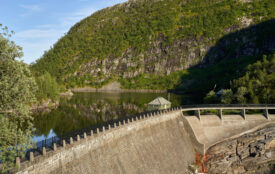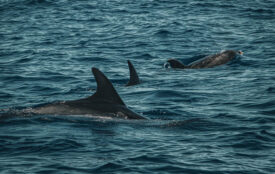Oil drilling off the Maldives: an underwater paradise under threat
So far, the coral reefs around the Maldives are a marine biological treasure, with more than 1.2 million tourists visiting the islands last year.
But this holiday paradise is under threat. In 2014, the first preliminary oil field surveys were carried out around the island nation, whose national oil company is seeking to encourage comprehensive seismic exploration using extremely loud airguns, while test drilling is also planned. The Maldivian government is keeping this oil exploration work strictly confidential – little of their plans have been made public to date. Marine conservation organisation OceanCare is today launching the “Emergency Call from the Maldives” international protest campaign. Events in 2014 proved that such a protest can make an impact, with similar action temporarily preventing oil exploration from taking place in the waters around the Balearic Islands.
The Maldives National Oil Company (MNOC) is planning to search for crude oil around their country’s atolls, a move which would affect one of the last largely intact underwater habitats. Oil exploration and production trigger environmental issues that will pose a serious threat to both marine animals and the Maldives’ fragile ecosystem. “The balance of this underwater paradise in the Indian Ocean is hanging by a slender thread,” said Sigrid Lüber, President of OceanCare. “The reefs are already under a great deal of pressure as a result of overexploitation and climate change. Now the noise created by the search for crude oil poses a further threat for the dolphins, turtles, fish and other marine animals around the Maldives. We want to ensure that the islands’ underwater habitat is protected from the noise of seismic airguns.”
Selling off their own underwater paradise
The search for crude oil beneath the seabed around the Maldives was one of President Abdulla Yameen’s key election pledges in 2014. The government is planning to promote the country as an oil producer but is keen to treat the search for oil as confidential. The fact is that the German research vessel “Sonne” carried out preliminary 3D seismic surveys back in August 2014, 100 nautical miles east of the region around Laamu and the Thaa atoll. According to Fisheries Minister Mohamed Shainee, this search led to the discovery of hydrocarbon source rock. “It is cynical for a region so strongly affected by global warming to consider developing its own fossil fuels,” the OceanCare president criticised.
The Maldivian government is reviewing the results of these preliminary surveys in the first quarter of 2015. Norwegian and German companies specialising in crude oil exploration have been asked to assist with this analysis. Third parties will not be granted access to the results.
Further seismic tests and test drilling are expected to follow. Among other duties, the MNOC has been tasked with making preparations for issuing seismic exploration licences. India has already agreed to assist in producing the crude oil before it is refined by neighbours India, Sri Lanka and Singapore. According to MNOC, the majority of the crude oil will supply the Maldives themselves.
“Emergency Call from the Maldives” protest
Today, OceanCare is launching the worldwide “Emergency Call from the Maldives” campaign. By doing this, the organisation is highlighting this imminent threat in its role as the initiator of the international “Silent Oceans” coalition and encouraging supporters to take part in its email protest aimed at the address of the Tourism Minister of the Maldives. The search for oil in the region must be called off immediately. “Local environmental organisations are deeply concerned,” Lüber explained. “One of them, Ecocare Maldives, specifically asked OceanCare for help. We are now hoping for support from the general public as well as the tourism industry in order to lend our protest more weight.”
In addition, OceanCare and its partners in the Silent Oceans coalition are publicly confronting the Maldivian government with a detailed “Statement of Concern” summarising the negative aspects of their oil production plans and expressing their grave concerns.
The power of public pressure
The power of public involvement was demonstrated by events in the Balearic Islands, where OceanCare – together with its coalition partners and thanks to protests by the local population – was able to temporarily stop the use of dangerous airguns in the waters around the islands. The local population also forced the withdrawal of oil group Repsol in the Canary Islands.
“The fact that oil companies are threatening to develop another fragile habitat and popular holiday destination should once again cause outrage,” Lüber concluded.
The Maldives: an invaluable underwater world
The abundance of coral reefs around the Maldives makes the area one of the most diverse marine habitats on the planet. The country’s coral reefs are the seventh largest in the world and home to 250 different species of coral, which teem with over 1,000 species of fish. Every year, thousands of scuba diving enthusiasts flock to this part of the Indian Ocean. Tourism and fishing are the islands’ most important economic sectors, making up 90 per cent of the Maldives’ gross domestic product. The concern voiced by local non-governmental organisation Blue Peace is that the environmental issues triggered by oil exploration and production would endanger both of these pillars.
Crude oil exploration: a deadly threat to marine animals
Oil exploration vessels use seismic airguns to explore oil fields under the seabed. The explosions emitted by these airguns measure up to 260 dB and are fired through the water for thousands of metres before penetrating hundreds of kilometres into the earth. Up to 20 airguns are fired simultaneously, each one generating a sound wave every 10 to 15 seconds, 24 hours a day, often for months at a time in the same area. These sound waves are among the most intensive and loudest noises mankind is capable of producing, and can be deadly for marine animals.
Make your voice heard on www.silentoceans.com to preserve the Maldives as both a diver’s paradise and the habitat for thousands of sea turtles, dolphins, whales, fish and other marine animals.
VIDEO: Emergency call from the Maldives








